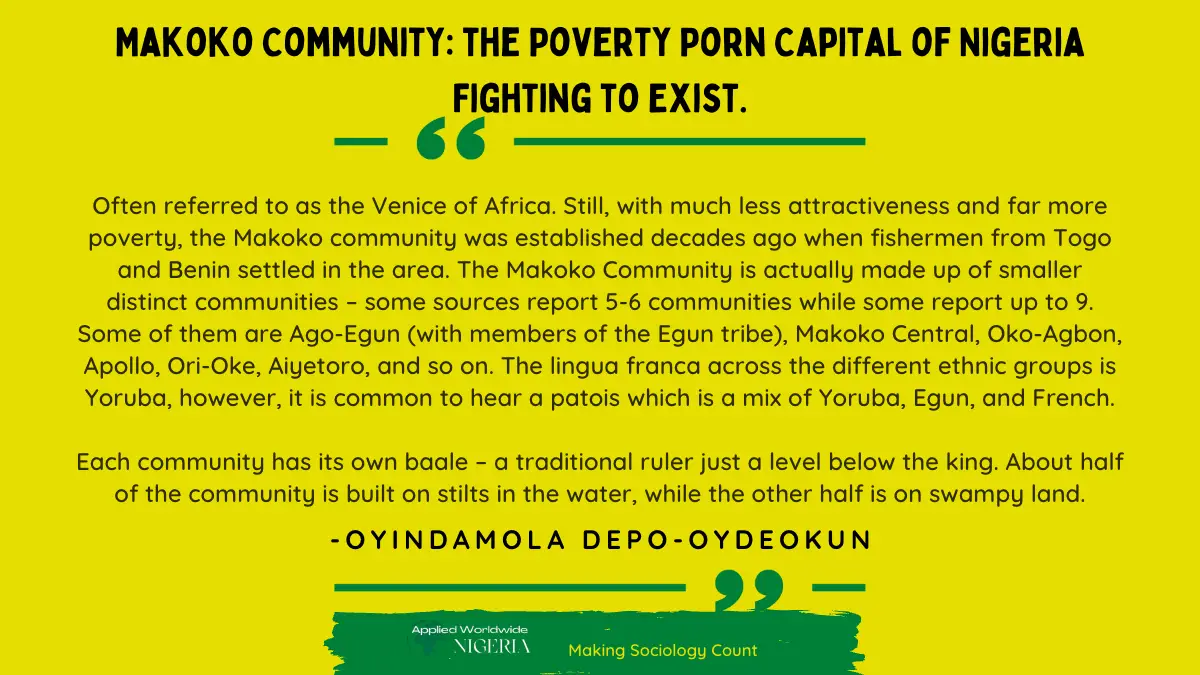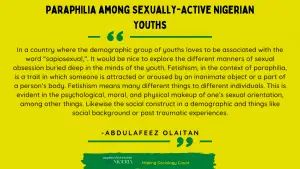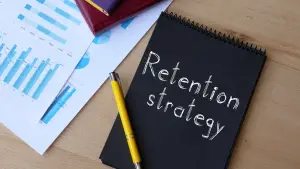Makoko community is many things to many people: home for its residents; a nuisance to the Lagos State government, a prime source for tourists and foreigners to observe poor people like animals; a never-ending charity case for non-governmental organizations (NGOs) and ordinary sympathizers; the biggest floating slum in Lagos and possibly, in the world.

The Makoko Community. Image source: Okoh Collins
Makoko Community and its Historical Friction with the Lagos State Government
Often referred to as the Venice of Africa, but with much less attractiveness and far more poverty, the Makoko community was established decades ago when fishermen from Togo and Benin settled in the area. The Makoko Community is actually made up of smaller distinct communities – some sources report 5-6 communities while some report up to 9. Some of them are Ago-Egun (with members of the Egun tribe), Makoko Central, Oko-Agbon, Apollo, Ori-Oke, Aiyetoro, and so on.
The lingua franca across the different ethnic groups is Yoruba, however, it is common to hear a patois which is a mix of Yoruba, Egun, and French. Each community has its own baale – a traditional ruler just a level below the king. About half of the community is built on stilts in the water, while the other half is on swampy land.
The water is essentially a road system through which residents commute on canoes. Some traders also use canoes as “shops”. The first time I visited, I saw canoes occupied with traders and their goods, including poultry and everyday household items. The major source of income for the community is fishing, followed by salt-making and sand dredging.
As of 2015, a World Bank document reported the Makoko population to be about 250,000, but more recent sources suggest they are significantly more. The actual population is unknown since the community is not formally recognized. The community has partial access to basic amenities such as water, health, and electricity.
The Residents of Makoko
The residents of Makoko have relentlessly – and mostly fruitlessly – asked for basic amenities such as a cleaner environment, electricity, good schools, and accessible healthcare. The wastewater from households (including excreta) all goes into the water.
“The entire Makoko has only one primary health care center, and the access to clean water is only through individual independent boreholes that the people fetch from at a cost. Some of these boreholes are situated very far from where the people live, hence they go a long distance to fetch carrying heavy buckets of water on their heads.
The electricity in the community is epileptic, and most of the day is spent in total blackout for the members of the community. Some use alternate power sources such as the generator to power their businesses,” explained Moses Okenla, the founder of Lighted Pearl Africa Foundation (LPAF), an NGO which started working in the community in 2020.

The Local Government has provided some plastic tanks of potable water, while others are privately owned. The lack of accessible health care has especially posed a problem for childbirth. Many women in labor have reportedly died in canoes on their way to the nearest hospital outside of the community. Moses claimed that there are a few registered nurses in the community, but very few medical supplies have been made available to them. There have been various attempts by the State government to develop the slum in the past, some albeit to the detriment of its inhabitants who have repeatedly protested to remain in the land they call home. Just in 2020, Premium Times reported that there was a local private developer who had obtained approval from the government.
Over the years, there have also reportedly been several demolitions conducted in the area at the behest of the Lagos State government. The 2012 demolitions alone displaced over 4000 members of the community. That year, the government cited the construction of the buildings under high-tension power lines as the reason for the demolition. In the 72-hour evacuation notice addressed to residents, the government stressed that the settlement was an “environmental nuisance, security risk and an impediment to the economic and gainful utilization of the waterfront.”
Worse still, the government initially failed to provide alternative accommodation to the displaced persons. It eventually suggested an area in Ikorodu as a relocation option, but they rejected it because they wouldn’t have access to the water and so, would be unable to fish. However, there is much truth to the government’s claims about the safety and health threats posed by the settlements.
Much of it was built without proper planning or permission from the government. Moreso, the lagoon’s ability to drain water during periods of heavy rain is impeded by the houses built in it. Nonetheless, many believe that the government’s main reason for the strong opposition to the community is so they can reclaim the land, sandfill it and sell it at exorbitant rates to the affluent; the concern for safety and health is secondary.
The Way Forward for the Community
After spending nearly 2 years in the community, Moses Okenla decided to start a mentorship academy in February 2022 as a way to tackle what he thought to be the root problem for the children of the community: a lack of mental transformation. “If you give a person all the tools they need, and they are not taught how they will use the tools, it will not yield any positive results. Mental transformation must go simultaneously with the physical interventions from the organizations willing to have a positive impact in Makoko,” explained Moses.
According to Moses, what sets LPAF apart from most of the organizations which have done charity work in the community is this extra “focus on the psychology and mindset of the people living in these slums”. LPAFs’ motto is “Zero Hunger, Education, and Transformation.” Moses believes the mental recalibration they are trying to achieve will “translate to wealth and development in the Makoko Area” in the long run. Consistent and dedicated mentorship is one significant way to ensure the children don’t end up in crime and other social vices, or even with adolescent pregnancies for the young girls in the community.
Since the onset of the mentorship program, which involves counseling, teaching mental math and other subjects, and semi-formal examinations, LPAF has recorded up to 80 registered children just in the space of months. Initially, only 30 out of 50 registered children showed up, but more parents started pushing for their kids to join the program after seeing the immense improvements regular attendees had made.
Moses also stressed the importance of partnering with community leaders and representatives, rather than just dropping food and other supplies and leaving. While such actions from NGOs are not ill-intentioned, there are some groups who have exploited the
community by soliciting funds from the general public with heartrending photos of them and then carting away most of the donations. “So many organizations exaggerate and inflate their impacts,” shared Moses.
“There’s a common perception in the community that charities capitalize off of their stories to enrich themselves, promise much but deliver very little and then leave the communities within a couple of weeks/months,” explained Abiola Adebiyi, the founder of Elevate Development Foundation (EDF), another NGO doing great work in the Makoko community.
During my visit, some “Area Boys” became hostile when they saw my friends and I bring out our phones. It was later explained to us that they didn’t like their photos to be taken because of all the exploitation that had happened. We were even told that some of them tracked what supposed NGOs said about their work there on social media and caught the lies. “We at Lighted Pearl Africa Foundation are data-driven and evidence-based. If we report a number as impact, it can be verified,” asserted Moses. If anything, this was evident from the friendly reception our LPAF escorts got from the Area Boys.

EDF has also made a lot of evidence-backed impacts and built roots in the community. Thankfully, the foundation believes there is still a lot of hope for the youth, so their work is focused on empowering the youth with education and skills acquisition training, thereby equipping them to “live purposefully”. EDF is also big on mental recalibration. Their headline project, Project A.C.E. (Access, Community Development, Education) features mentorship and personal development programs to help reorient the Makoko youths’ outlook on the world.
The project also connects the youths with figures who work in their desired industries and are thus able to expose them to a world of opportunities outside of the community. EDF hopes to boost their motivation and employability and spur them to develop their own communities by becoming changemakers. A number of smaller social change projects have been offshoots of EDF. “We chose to focus on youths between 16 and 33 years old because they were grossly underserved in the community. The children are very popular impact demography in Makoko, so we decided to direct our
resources to the group that needs it” shared Abiola Adebiyi.
However, much like LPAF, EDF did not start out with development projects. After 2 years of providing relief items for members of the community, and reaching an astounding 7,000 people, they shifted their attention to human capital-centered programs in December 2018. Since then, they have worked with 295 children and youths. Speaking on some of EDF’s biggest challenges so far, Abiola addressed the lack of accessibility for female children and youths. “Traditionally, the boys/men are tasked with fishing very early in the morning. The girl child accompanies her mum to the market and sells fish from morning till night. So, when programs run, it’s boys/men that are mostly available. Girls are either busy helping their mums with business or domestic work.
“Some modernistic solutions proposed by the NGOs are contradictory to the culture of the Egun people. It takes a lot of convincing for a parent to allow their girl child to go to school,” shared Abiola.

Abiola also stressed the importance of government intervention in spurring sustainable, large-scale change. “The long-term solutions exist, but many can’t be implemented due to the constant threat of eviction by the government.” The absence of a “solid system of continuity” has also deterred the permanence of some solutions, according to Abiola. “An NGO built a borehole in the community. Now, it no longer works because the community wasn’t taught to maintain it,” narrated Abiola.
With more empathetic government intervention and more organizations like LPAF and EDF aiming for long-term development, the future will certainly look brighter for Makoko. In the meantime, we ordinary individuals can stop turning a blind eye to the real need in the community.
Sources: The Guardian, Smart Cities Dive, CNN.







